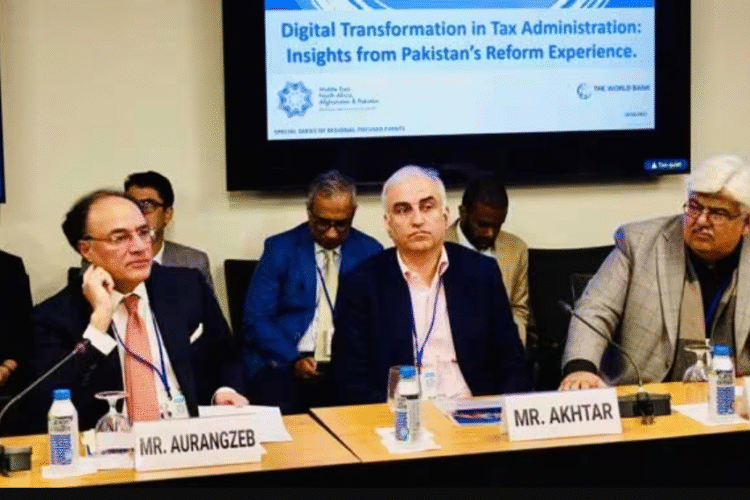Pakistan’s Federal Board of Revenue (FBR) has earned global recognition after being invited by the World Bank to present its comprehensive tax transformation as a case study in public sector reform during the annual meetings held in Washington, D.C.
The session was attended by Federal Minister for Finance and Revenue Muhammad Aurangzeb, FBR Chairman Rashid Mahmood Langrial, Secretary Finance, Secretary Economic Affairs Division, and other senior officials. The event marked a milestone moment for Pakistan’s public sector reform and its growing international credibility in digital governance and fiscal management.
During the session, Finance Minister Aurangzeb detailed how Pakistan successfully executed one of its most ambitious institutional reforms, modernizing the tax system across people, processes, and technology. He stressed that the transformation is homegrown, fully supported by the Prime Minister and Federal Cabinet, and represents a major shift toward efficiency, transparency, and long-term sustainability.
Highlighting the reform’s impact, the minister noted that the plan has already begun showing visible improvements in macroeconomic indicators, reflecting a turnaround in revenue administration. These reforms, he said, are key to establishing a strong foundation for sustained economic growth and resilience.
In his presentation, Chairman Rashid Mahmood Langrial revealed that the FBR’s efforts have increased Pakistan’s tax-to-GDP ratio from 8.83% in FY 2023–24 to 10.33% in FY 2024–25, the largest single-year improvement in 23 years. This success, he explained, stems from a data-driven strategy that prioritizes compliance, efficiency, and transparency.
Langrial shared that the transformation journey began with an eight-week planning sprint in 2024, incorporating feedback from field officers across Pakistan and guided by a dedicated Delivery Unit. He emphasized that unlike previous attempts, this reform was fully owned by the country’s top leadership, ensuring accountability and progress.
He noted that while technology is essential, it alone cannot ensure success. The FBR’s upcoming IRIS 3.0 platform, a next-generation tax system, will simplify tax filing with pre-filled data and automated workflows. However, he stressed that genuine transformation depends on structural and process reforms alongside digital innovation.
The session featured an engaging dialogue with global delegates. Egypt’s Minister of Finance Ahmed Kouchouk praised Pakistan’s approach as “the right way to do reforms,” calling it one of the most compelling reform presentations he had seen in his decade with the World Bank.
Participants highlighted the importance of sustained leadership, coordination, and political will in implementing such wide-scale reforms. Key takeaways included the need for homegrown solutions, simultaneous implementation, and top-level political commitment.
World Bank officials, including Sandeep Mahajan, Regional Practice Director for Prosperity (MNAAP), applauded Pakistan’s achievement, describing it as a model for other developing nations. He noted that Pakistan’s case could serve as a benchmark for South-South cooperation in improving domestic revenue mobilization and supporting development goals.
The session concluded with resounding applause, marking a proud moment for Pakistan. The recognition by the World Bank reaffirmed Pakistan’s growing stature in digital transformation and fiscal innovation, underscoring the government’s ongoing efforts to build a transparent, citizen-centric, and efficient tax administration system.
Topics #city magazine #city magazine pakistan #FBR #Finance Ministry #Global Recognition #IRIS 3.0 #Pakistan Economy #Public Sector Reform #Tax Transformation #World Bank



